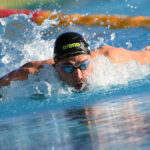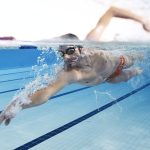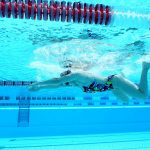The importance of hydration for swimmers
Hydration for swimmers is perhaps one of the most underestimated aspects.
Find out what, how much and when it is important for a swimmer to drink!
Bearing in mind that most weight loss during training is mainly in the form of liquids, it is obvious how important it is to reintegrate what you have lost. It is particularly overlooked in swimming because, compared to other sports, you do not realise how much liquid you lose in the pool.
For example, you sweat and feel hot when you go for a run or play football: the logical consequence of this is to drink cold water, even just to cool yourself down.
You do not feel like you are sweating when you swim, but you lose liquids just the same, for example by producing more urine. That is why you are more likely to suffer from dehydration problems.
Inadequate levels of hydration for swimmers: what kind of problems are we talking about?
The most obvious problem is the greater likelihood of suffering from cramps. Creating a water imbalance disrupts the process of muscle contraction and, hence, results in cramps.
This can also cause sudden changes in body temperature, cardiac stress and a feeling of weakness. This inevitably means that failing to hydrate before/during/after physical exercise can affect your performance.
All this can be avoided in two ways
- Firstly, just keep hydrated throughout the day
- Secondly, always have at least a half-litre (or, better still, one-litre) water bottle with you at the poolside.
What should be in the bottle?
Ordinary mineral water is better than nothing. There are plenty of ready-made products on sale or products you can prepare yourself, which are marketed as being the very best for sports. Rather than recommend any specific brand, my advice is to learn how to read the label and make sure that your drink:
- Tastes good (obviously this is a subjective matter).
- Contains at least some carbohydrates (approximately 8%).
- Is easy to digest. Easily digestible
- Contains no artificial colourants.
If, on the other hand, you would rather have a homemade drink, here is my perfect “recipe”:
- 500-1000ml of water.
- The juice of 1-2 carefully squeezed oranges (or tangerines/lemons).
- A pinch of salt.
- 2-4 bags of sugar.
Finally, here is something to bear in mind to avoid any problems
Never wait until you are thirsty to take a drink. Remember that feeling thirst is an alarm bell your body sets off to warn you that it needs liquids and minerals. Most importantly, being in the water tricks your body’s sensory receptors and stops you from feeling thirsty.
Drink a small amount frequently rather than a lot occasionally!
Cheers!
Articles you may also like
Help, a cramp! Tips and remedies to deal with it
Written by:
arena coaches
Swim coaches, trainers and experts will give you all kinds of tips for performing at your best in both training and races.








